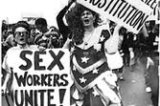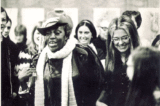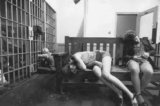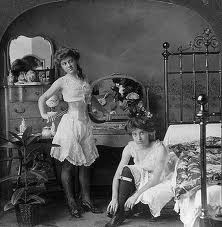
Prostitution in Boston combines dramatization, music by Tina Turner, Aretha Franklin and Patty Labelle along with stories from a seasoned prostitute as well as comments from a vice-squad officer, a conservative Criminal Court Judge and legal activists including feminist attorney, Flo Kennedy who argue for decriminalizing prostitution. This half hour documentary was produced in Boston at WBCN-FM in the spring of 1975.
It begins with a playful scene of a pick-up effort in a bar. A young married white man offers a weary black woman $25 for “social services.” She refuses implying his offer equals “welfare.”
Through interviews a savvy Black prostitute describes her journey from the South to Boston where working as a junior secretary she was targeted by her bosses for charm school and training to become a high-class hooker for their clients. “The money was attractive.” She eventually quits her day job and meets a pimp and launches into a full-blown life of prostitution. She marries twice, both husbands are pimps. She serves time. But she witnesses a change in the profession. The pimps are now less classy “I call them the Howard Johnson 28 flavor kids. They have no finesse. They don’t know how to dress a woman, or set her up for the fancy places.”
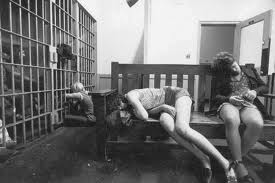 Harry Mannis of the Boston Vice Squad also notices a change. “The girls on the street are younger — 17 say — and more of them are coming in from the suburbs.”
Harry Mannis of the Boston Vice Squad also notices a change. “The girls on the street are younger — 17 say — and more of them are coming in from the suburbs.”
Through narration we learn about the history of prostitution laws. The syphilis epidemic in Europe in the 17th, 18th and 19th centuries provoked making prostitution illegal. At the turn of the last century in New York, with the influx of millions of poor immigrants, “white slavery” became a huge concern. Women were kidnapped off the streets to be sent as sexual slaves or to prostitution houses. The westward expansion of the country had meant communities of men without women and that, too led to an increase in prostitution. By 1910 the Mann Act made women prostitutes criminals. The double standard for women, the hypocrisy of criminalizing only one partner in the transaction was ingrained into law.
But in Boston of the early and mid-70’s something else is going on. Black prostitutes are being banned from the entertainment clubs of the Combat Zone and consequently are forced to become streetwalkers. Of all the whores working clubs, or houses, or from their apartments, it is the streetwalker who is most vulnerable to arrest. Daily, streetwalkers file through the courts and legal system in Boston. They fine is usually $200 and 6 months in jail. Some 70% of women in Massachusetts prisons were originally arrested on prostitution charges. To pay the fine, the court costs, the attorneys, these women go right back onto the street. It’s a revolving door system.
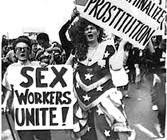
But in the early 70’s Hookers Unions began forming in the U.S. COYOTE, founded by Margo St James in San Francisco — it’s acronym stands for “Call Off Your Old Tired Ethics” argues for decriminalizing prostitution. Why should women bear the burden of the law? Why not go after the Johns?
Criminal Court Judge DiGuliamo argues against decriminalizing or legalizing prostitution. “The Combat Zone is a center for dope and venereal disease. Think about it, you’ve been a good girl — a good wife — and suddenly you go to the doctor and he tells you you’ve got advanced syphilis. You’re pregnant. Your baby will be syphilitic. Is that what you want?”

One vice-squad officer accuses many of the streetwalkers of being robbers. COYOTE challenges both the venereal disease myth about hookers and the thievery myth. While they acknowledge some thieves pose as hookers, what prostitute would want to damage her ability to keep earning money from prostitution. Also, that hookers are particularly careful about their health. COYOTE and other hooker unions offer free medical screenings for hookers. It is young people who carry and spread 84% of venereal disease.
Another argument used against decriminalizing prostitution has to do with the behavior of pimps. Flo Kennedy, a feminist attorney and supporter of hookers unions, argues vociferously against thinking pimps are any more abusive to women than husbands or boyfriends. She believes it’s all about economics. “If a hooker earns $100 a night and a file clerk earns $100 a week while a housewife earns nothing, “f…ing, cleaning, cooking and babysitting and the whole bit…” then it’s obvious.
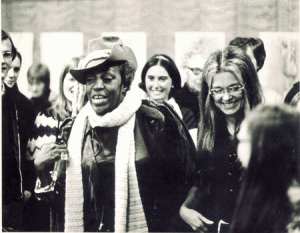
Boston legal activists, Cathy Allen and Nancy Gertner, argue that it is the streetwalkers who are the most discriminated against in the society in terms of options for work.
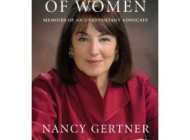
While some members of the legal community have argued to legalize prostitution, the hookers unions have opposed this. Nancy Gertner: “They believe that if legalized the state then becomes the pimp and the women are labelled.”
Gertner argues that something needs to be done to address this degrading situation for all parties.

